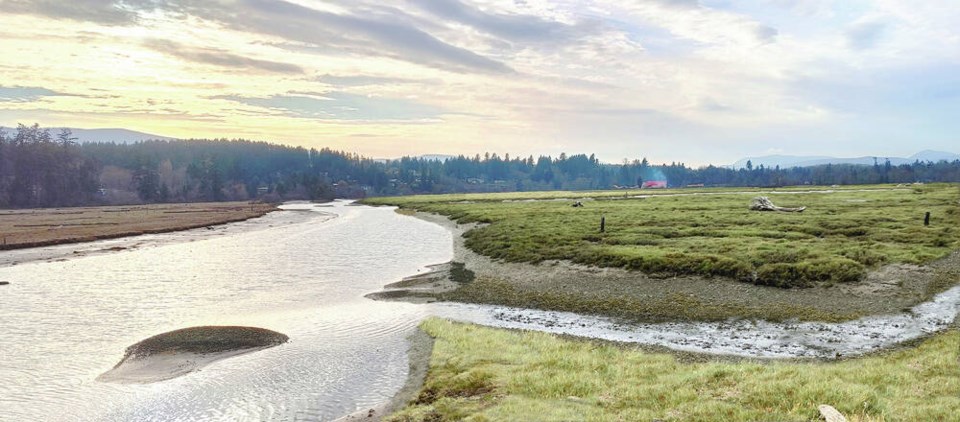The largest estuary restoration project on Vancouver Island will see the removal of two dikes and restoration of 70 hectares of marshlands along the Cowichan River Estuary.
The Cowichan Estuary Restoration Project, with an estimated price tag of more than $3 million spread out over two years, will see the Koksilah Marsh dike dismantled in August and the Dinsdale Farm dike come down in 2024.
The goal of the dikes’ removal, along with the creation of intertidal channels and salt marsh habitats, is to reconnect parts of the estuary that have been cut off from tidal action due to human activity in the area since the 1800s.
The area was initially used for log storage and shipping. In the 1950s, the estuary was bisected by construction of the Westcan Terminal Causeway.
“This is a large project with many partners and years in the making,” said Thomas Reid, west coast conservation land management program manager for the Nature Trust of British Columbia, which is overseeing the project in partnership with Cowichan Tribes, Ducks Unlimited Canada, the Ministry of Water, Land and Resource Stewardship, the Ministry of Forests, Fisheries and Oceans Canada, Environment and Climate Change Canada and Habitat Conservation Trust Foundation.
Reid said the restoration project is an essential step to protect biodiversity and enhance resilience against rising sea levels.
“Due to the climate crisis and human intervention the coastline is caught in a ‘coastal squeeze.’ When the tide comes in, the water has nowhere to go,” he said. “By removing more than two kilometres of dikes at Dinsdale Farm and Koksilah Marsh, we will restore the natural processes.”
The project is the culmination of collaboration between conservation agencies and the Cowichan Tribes, who began a campaign to acquire, manage and restore as much of the estuary landscape, starting in 1985. Most of the land covered in Tuesday’s announcement is already protected and overseen by the Cowichan Estuary Environmental Management Plan.
Located near Duncan, the estuary is considered one of the largest and most productive intertidal zones on Vancouver Island. Although they only make up 2.3 per cent of B.C.’s coastline, estuaries support more than 80 per cent of its wildlife, birds and fish.
Under the plan, the Cowichan Valley Regional District will assume responsibility for the maintenance of the walking trails on the property.
“I cannot stress how impactful this project will be to the fish and wildlife in the area,” Reid said.
The Cowichan Estuary Restoration Project is funded by the B.C. Salmon Restoration and Innovation Fund, a contribution program funded jointly by Fisheries and Oceans Canada and the Province of B.C., Fisheries and Oceans Canada’s Aquatic Ecosystems Restoration Fund and Cowichan Tribes through the Aquatic Habitat Restoration Fund.
The project’s development has also included a technical/scientific advisory committee composed of nearshore scientists from British Columbia and the United States National Estuary Research Reserve System.
For more information, go to estuaryresilience.ca/cowichan-estuary-restoration-project.



